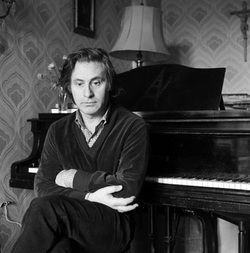 Alfred Schnittke isn't exactly a fun guy.
Alfred Schnittke isn't exactly a fun guy. The first of the Canadians was R. Murray Schafer. Now in his eighties, he was coaxed from his rural retreat to the big city for a performance of his No Longer Than (10) Ten Minutes. The origins of this piece are the stuff of new-music lore in Canada: it was composed in 1970 on a commission by the Toronto Symphony Orchestra, on the stipulation that the piece should not exceed 10 minutes. As a protest against this limitation, Schafer made the time-restriction the work’s title.
This is all good fun – but what does No Longer Than (10) Ten Minutes sound like? It’s a child of its era: pretty much atonal, and filled with swirls of dense, complex textures. In his notes Schafer says it was, in part, inspired by his “soundscape” research, and I believe him. However, what makes the piece a superior example of the musique-concrète-for-orchestra approach is Schafer’s unerring sense of drama and timing. There’s an organic, narrative quality to this music: ideas germinate until they blossom in culminating bursts of sonic colour.
As for the ending of the piece, there were three rounds of applause, each “answered” by musicians on stage or in the balcony. Then, without a pause, Pauk returned to the stage to lead his orchestra in the second Canadian work of the night: Zipangu, by the late Claude Vivier.
Zipangu, written in 1980 and scored for strings only, is not so dense as Schafer’s 10-minute essay. It’s also more melodic, and it inhabits a tonal system all its own. There’s a timeless, ritualistic aspect to this music, and it’s certainly powerful – as though plugged in directly to the mysterious forces of the universe. Yet where Schafer’s piece had an outward, almost showy, quality, effectively calculated to impress the listener, the Vivier was more inward-looking. At times, the composer’s musical ruminations seemed like the working-through of private obsessions, a process intended for him alone.
Samy Moussa was represented by two short works for full orchestra: Gegenschein and Zodiakallicht. This Montreal-born composer clearly aligns himself with European high-modernism – and these pieces, composed in 2009, could be described as 20th-century music written in the 21st century. Following in the footsteps of Varèse and Boulez, he filled these short pieces with dissonant angularity for dissonant angularity’s sake. Moreover, the kind of unfoldings and tensions that made the Schafer and the Vivier work well don’t appear to be Moussa’s strong suit. He is no doubt a skilled composer, in many ways – but with these pieces, he was travelling a path that’s both well worn and (I believe) a dead end.
The second half of the program was given over to one work, Alfred Schnittke’s Viola Concerto of 1985. For this piece, a piano, harpsichord and a harp were added to the orchestra. And the soloist was Teng Li, principal violist of the Toronto Symphony Orchestra.
The substantial scale of this work – it’s in three movements and about half-an-hour long – was fully justified by its fascinating content, effective development and brilliant contrasts. The predominant mood of the piece is a bleakness so bleak that it makes Shostakovich sound all blissed-out. Yet there’s much more going on – including shards of “Romantic” music, eerily harmonized. Like old photos in modern frames with the glass shattered, these episodes were arrestingly disjunct and multi-layered.
For a soloist, Esprit couldn’t have done better than Li. Her rich tone brought a much-needed warmth to this piece. Her second-movement furioso opening was astonishing in its intensity. And in Li’s hands, the daunting chords in the cadenza at the start of the third movement were no impediment to the soaring grande ligne of the passage.
Under Pauk, the Esprit Orchestra has grown into a major exponent of new music in Toronto. No rhythm is too complex, no tessitura is too extreme for these players. Neither slithery glissandos nor hair-splitting microtones faze them. Moreover, there’s a palpable enthusiasm for this repertoire among these musicians. This wasn’t always the case, some decades ago, when Canadian orchestras were called upon to play new works. Just ask Schafer about some of his experiences, back in the Bad Old Days.
© Colin Eatock 2013
 RSS Feed
RSS Feed

